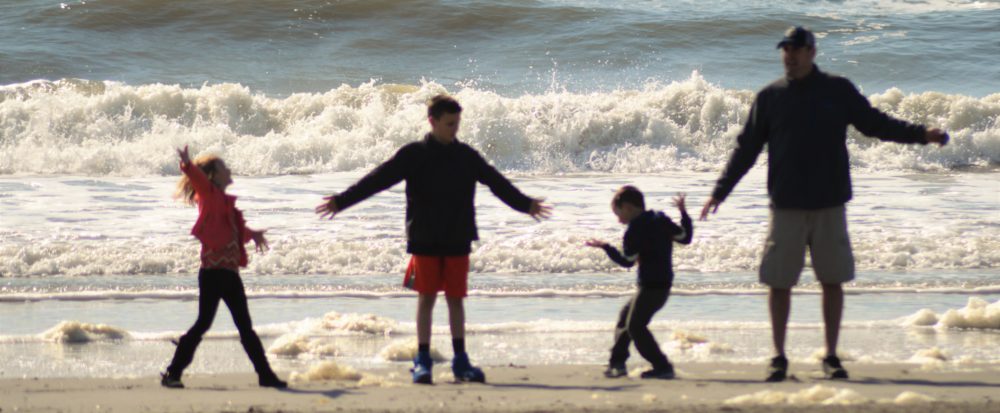“You’re my best friend,” Declan says as he walks into the room.
My heart melts. I boisterously say back, “Why thank you, Declan!! You’re my best friend, too!!!”
So I hug my best friend. Give him some kisses and snuggle with him while we watch one of his favorite shows, Teen Titans, Go!
Halfway through the episode, Cyborg says to Beastboy “and that’s why you’re my best friend…” There is a certain familiar cadence to the dialogue, and before I can find it anymore intriguing, Declan begins repeating the same, “you’re my best friend” over, and over, and over again.
Echolalia
One of the first sentences Declan repeated was the phrase, “Awww, c’mon…are you kidding me?” It took us awhile to figure out what he was saying, but when he said it, I was super proud.
During an evaluation he must’ve said it 15 times. The Developmental Pediatrician who evaluated him asked me what it was from and I told her, it was something Dad says at home and Declan repeats. And I made sure to point out to her, “It’s a 6 word sentence.”
In the evaluation report by the DP that diagnosed Declan with autism, it was pointed out to me this repetition of speech was called Echolalia.
Echolalia is repeating what one hears.
According to the National Institute of Health, by 6 months of age babies are able to recognize basic sounds of their native language. Babies will speak their first words between 7-12 months of age.
Declan said his first word at 9 months: Dada. Catelyn’s first word was at 10 months: Dada. Bobby, my oldest, spoke his first word at 11 months: Dog. The words were spontaneous.
The children’s language continued to grow. Declan’s speech grew by leaps and bounds until he was 2 years old, when his speech faded away to a couple of words. I had reached the point where I was describing him as “non-verbal.”
Declan’s speech slowly returned. In words and short phrases he had heard and was repeating. Catelyn’s language developed on time, but in the same way.
When Catelyn was very young, her vocabulary was immense. She would say very long sentences. Problem was, the sentences did not fit the situation. She did not know what the words meant.
When Declan started to form new words and sentences, they did not always match the situation, either. But heck, I didn’t care. He was talking!
Catelyn and Declan repeated sounds that they heard. Eventually they were able to take the sounds and make them into words and sentences. The next step? To make those words and sentences meaningful. Both of their speech evolved from something once heard and repeated, and eventually turn the words into something spontaneous.
Self-Stimulating
Declan repeated sounds and was able to apply the sounds into language. But he also repeats sounds that are pleasing to him. They form a self-stimulation aspect.
Say something to Declan in a pleasing tone, in a sing-song voice and he will repeat it over and over. He is a copycat in this way. There are days he comes home from school saying, “get a good night sleeeeep…..get a good night sleeeeep….get a good night sleeeeep…..” and I know someone at school said this to him that day. And it will pop up in his speech throughout the day. Over and over again.
Declan is impulsive. If I need him to hear me, I will sing my sentence to him. The sound makes him stop to listen. He enjoys the sound and will sing it back. He may sing it throughout the day as well. Because he finds the sound pleasing and by singing it, he feels good.
Most children will copycat the sounds that they hear as they form language. But when the repetition of speech is unique or goes well past the time of speech development, echolalia may be the result of something else.


Robyn, I applaud your bravery in writing about this topic often. I learn so much from you. This piece is very compelling .. great work! I like how you weaved in the prompt to talk about echolalia!
Thank you very much, Darryl!
Never knew that here was a word for that! Learn something new each day. my little brother who is a grown adault still exibits that echoing effect. Didn’t grow out of it, unfortunately.
From what I understand, some people will stop repeating speech once they have fully acquired language while others will do it for the rest of their life. Declan repeats speech to learn language, but also enjoys certain cadences to the point he repeats them for self-gratification. I would imagine he will demonstrate echolalia into adulthood as well.
Very educational
Great piece. I love that you sing things- brilliant! Thanks for sharing your world.
Thank you! Thank you for reading!
I think it’s wonderful that you sing what he needs to hear.
Thank you! It really helps get his attention.
You do what is best, and that’s all you can do 🙂
Love that you sing him sentences! And I bet he heard his dad say, “Awww, c’mon….are you kidding me?” During a Philadelphia Eagles game!! 😃
Hahaha… I think you are right! 🙂